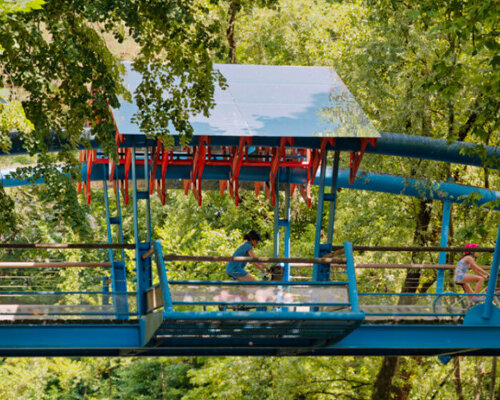KAPIA installation spans the Sainte-Thérèse du Québec footbridge
KAPIA is a site-specific timber and mirror installation designed by GRRIZ for Annecy Paysages 2025, located on the Sainte-Thérèse du Québec footbridge along the Thiou river in Annecy, France. The project seeks to transform a simple point of passage into a place of pause, encounter, and contemplation. The design draws inspiration from the kapia of traditional Ottoman bridges in the Balkans, architectural pauses at the center of bridges, historically conceived as civic spaces for exchange and dialogue. On the existing footbridge, two fixed benches were already placed at the midpoint, discreetly suggesting a moment of rest. GRRIZ chose to enhance this latent potential by constructing an architectural canopy that defines the space, offers shelter, and amplifies one’s perceptual engagement with the landscape.
KAPIA blends with the Thiou river and surrounding greenery | all images by Wilfrid Bof unless stated otherwise
GRRIZ clads geometric timber canopy in mirrored dibond panels
The structure is entirely built from Douglas fir timber, assembled as a lightweight frame that rests delicately on the existing bridge without altering its geometry or circulation. This reversible approach was a technical challenge for GRRIZ creative studio, requiring precise detailing to anchor the intervention while respecting the existing infrastructure. The timber elements are finished in a coral-toned protective coating, chosen to establish a chromatic resonance with both the urban fabric and the natural vegetation of the site. Above, the canopy is clad in mirrored dibond panels, a reflective composite material that captures and refracts the changing qualities of sky, light, and water. These mirrored surfaces generate shifting, almost painterly reflections that evolve with weather conditions and the presence of passersby, introducing a dynamic, expressionist dimension to the work.
side perspective showing the mirrored upperside reflecting sky and trees
canopy creates chromatic and reflective dialogue with the river
KAPIA thus emerges as a functional sculpture: a suspended threshold, open to all, belonging to none. It invites pedestrians and cyclists to slow down, sit, observe, and reconnect with the river and the city. Through its minimal geometry and play of reflections, the intervention redefines the perception of a familiar passage, turning it into a shared space of attention and imagination. The project was developed by GRRIZ following the invitation of curator David Moinard, and produced by Bonlieu Scène nationale Annecy.
the coral-toned canopy emerges at the center of the Sainte-Thérèse footbridge
the bridge is transformed into a place of pause and encounter
detail of the structure lightly resting on the existing bridge
pedestrian approach, highlighting the integration within daily urban life
geometric rhythm of the coral-painted timber structure
detail of intersecting frames and mirrored surfaces, creating layered views
close-up of the Douglas fir frame and mirrored surfaces | image by Mattia Paco Rizzi
abstract reflection of the landscape captured by the mirrored canopy
dynamic play of light and colors on the reflective underside
shifting moiré-like reflections evoking a painterly effect
project info:
name: KAPIA
architect: GRRIZ | @grriz_studio
design team: Mattia Paco Rizzi, Luigi Greco, Giulia Cerrato
location: Sainte-Thérèse du Québec footbridge, Annecy, France
materials: Douglas fir timber, mirrored dibond
dimensions: 7.6 × 4 × 2.5 m
photographer: Wilfrid Bof, Mattia Paco Rizzi
designboom has received this project from our DIY submissions feature, where we welcome our readers to submit their own work for publication. see more project submissions from our readers here.
edited by: christina vergopoulou | designboom
The post coral-toned timber and mirror canopy by GRRIZ transforms footbridge above river in france appeared first on designboom | architecture & design magazine.

